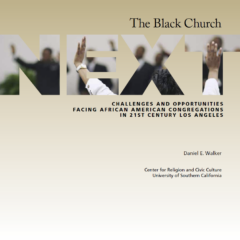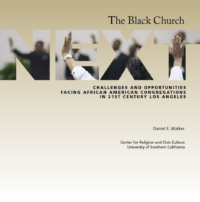The Real Estate Crisis and its Effect on the Black Church
All faith traditions are affected when parishioners lose their jobs and homes. As much a spiritual crisis as a financial one, in times of economic hardship faith leaders and congregations are asked to do more with less. With requests for assistance coming from inside and outside of their defined membership, a large-scale economic downturn places tremendous pressure on all places of worship, irrespective of their ethnic make-up. In the case of African American churches in Los Angeles, California’s role as one of the center’s of the mortgage foreclosure crisis is having an effect on both weekly donations and the long-term viability of the physical spaces where congregants meet and worship.
Encouraged by increasing donations, many fueled by member’s refinancing of their homes, church fortunes became wedded to the highs and lows of the Southern California housing market. Hoping to repair old buildings, expand facilities, and increase space to offer additional social services, artificially elevated balance sheets allowed congregations to qualify for new financial products being offered to religious institutions.
Because Blacks and Latinos were disproportionately saddled with high-risk mortgages, even while they possessed good credit scores, when the housing bubble burst these communities were decimated. For churches, decreasing real estate values and tithes coupled with escalating interest payments and requests for assistance created a firestorm that has yet to be extinguished.9
In Los Angeles, the impact of the foreclosure crisis on the economic fortunes of churches is evidenced in the recent trials of Broadway Federal Bank.10 Founded in 1946, Broadway opened its doors on 43rd and Broadway with a mission to serve the throngs of new Black migrants coming to the city. Soon moving to its flagship headquarters on 45th and Broadway, over the next 60 years it rode the economic and political ebbs and flows of its local community. In 1992 its main office was destroyed during the unrest following the Rodney King verdict.
The bank eventually relocated its headquarters to the Park Mile section of Mid-Wilshire and opened a new branch office on Martin Luther King Blvd. and Figueroa. With nearly one in four of its loans made to churches, Broadway is one of the main lenders to houses of worship in South Los Angeles, Compton, and Inglewood. In response to its deteriorating overall financial status and interventions by federal regulators, Broadway foreclosed on three churches in 2010. In September of the same year, 20 percent of its church loans were at least 30 days past due and 12 percent were more than 90 days late.
Comments While a number of African American churches were able to survive and thrive during the demographic shifts of the 1980s and 1990s, the economic downturn of the 2000s left many formerly successful congregations struggling to enhance revenues, cut expenses, and fashion a message for parishioners trying to make sense of their extreme change of fortune. In addition to the role played by predatory lenders and the decline of the stock market, church leaders and parishioners also must shoulder a share of the blame for their current financial predicament. As the economy begins to show limited signs of recovery, there are ample lessons to be learned from the nation’s most recent episode of boom and bust. For faith leaders, the need to educate themselves and their congregants on the larger workings of credit and debt markets is a lesson that should not be missed. With high levels of credit card debt disproportionately hindering African American household incomes, the church can become the much-needed conduit for educating a wider community about the value of personal saving and educational investment while warning against the perils of speculation and conspicuous consumerism.
Questions
- Can faith leaders use the lessons learned from the real estate crisis to create a sound economic foundation for the future?
- What constitutes a healthy balance between a message of economic austerity and hopeful financial deliverance?
The Economic Fortunes of Black Women and their Effect on the Black Church
Like many religious traditions women outnumber men in African American churches. In Los Angeles and across the nation, it is their time, talent, and tithes that provide the social and economic base of the Black Church. Given this reality, the economic fortunes of Black women are one of the most significant barometers of the economic health of the 21st century African American church. If information contained in the 2010 study “Lifting as We Climb: Women of Color, Wealth and America’s Future” (Insight: Center for Community Economic Development) is any indication, the African American church is on shaky ground.
Centered on the often-ignored question of wealth, the total value of one’s assets minus debts, the study found that single Black women have a median wealth of only S100 and that an astounding 46 percent of all single Black women have zero or negative wealth. Interestingly, even though single African American women have higher graduation, college attendance, and college completion rates than single Black men, they still lag behind their male counterparts in median household wealth ($7,900 to $100). According to the study, “while white women in the prime working years of ages 36-49 have a median wealth of $42,600, the median wealth for women of color [including Blacks and Latino women] is only $5.”
Comments While it is true that Black women have a long history of strength, resilience, and innovation in the face of adversity, to cite these facts and dismiss current economic realities would have disastrous effects on both African American women and the Black Church. Given monumental changes in social, familial, and economic relations in Los Angeles and across the nation, new strategies must be enacted to address these realities. Facing their long history of resistance to gender equality in religious leadership, many faith traditions must begin to engage in advocacy and engagement around the issue of gender equality in the workplace. For African American churches specifically, progress on the issue will have a direct effect on their ability to grow and flourish throughout the 21st century.
Questions
- Does the historic stand of mainstream religions against gender equality in the sanctuary hinder their ability to be effective advocates for gender equality in the workplace?
- Does the economic self-interest of the Black Church necessitate it taking leadership on the issue of gender equality in the workplace?
Daniel Walker was a research associate with the USC Center for Religion and Civic Culture until 2012.


